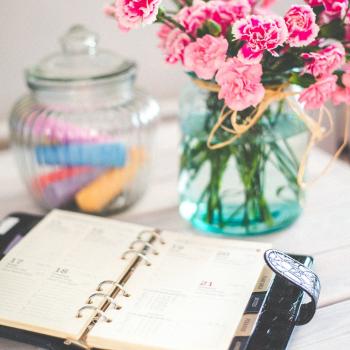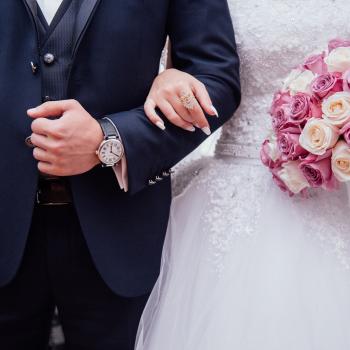If you’ve been watching the CW’s third season of Jane the Virgin this fall, you know that Jane is a virgin no more. I’ve been meaning to write about the episode in which Jane—I hate the terminology here, “gives up her virginity” implies something was lost but “becomes sexually active” isn’t as clear as it should be—but to be perfectly honest, I probably should have written about this show long before this moment.
I’ve been watching the CW’s Jane the Virgin since the first season was released on Netflix. I was cautious, initially. I was raised in a conservative evangelical community that tied women’s value to their virginity. That was not a healthy approach, to say the least, and I’ve spent years overcoming the negative effects virginity-centered purity culture had on my sex life—even after I was married.
I gave the show a very tentative try—and immediately loved it.
The show centers on three generations of women living together in the same home: Jane, a college student still living at home; Xo, her single mother; and Alba, Xo’s mother, called Abuela by nearly every other character. Alba is a devout Catholic who uses manipulative imagery to urge Jane to remain a virgin until marriage. Alba gives Jane a flower, and explains that having sex before marriage would be like crumpling that flower. This is a terrible metaphor.
I would likely have found this show very uncomfortable to watch, given my background, if it were not for several mitigating factors. First, while the show’s portrayal of Alba is sympathetic, you never get the sense the producers either endorse or approve of her urging. This is not a moralistic fable designed to promote virginity until marriage as an ideal to aspire to, and Alba herself is a flawed character.
Second, Jane’s mother, Xo, who also lives in the household, is both single and openly sexually active. There is tension between Xo and Alba, but Alba neither disowns Xo nor throws her out of the house. Xo presents Jane with an alternative approach from that presented by Alba. In other words, celibacy until marriage and sex positivity are actively represented in the household as models for Jane.
Third, Jane is allowed to spend time alone with her boyfriends without being subject to guilt, manipulation, or monitoring, and she does not have a problem with heavy doses of making out (something that was verboten in my own upbringing). There is none of the control or surveillance surrounding Jane that there was surrounding dating and physical contact in my parents’ household.
Have a look at this excerpt from the pilot episode:
While the expectation that she wait until marriage to have sex was the same expectation that I experienced in my own upbringing, the lack of control or surveillance and Jane’s willingness to engage in sexual activities that didn’t involve intercourse make Jane’s experience vastly different from my own painful experience.
I got the sense, over time, that Xo worried about Jane’s decision to remain a virgin even as she respected her autonomy. Xo was not overly pushy, but she did make sure to remind Jane on a number of occasions that being sexually active was not a bad thing, and that she didn’t have to remain a virgin. To me, that felt important.
For her part, Alba was pleased with Jane for her decision, and never made a secret of that. In part, this seemed related to Alba’s disappointment with Xo becoming pregnant as an unwed teenager. It was almost as though Alba is trying to make up for that with Jane, something she probably should have hashed out in therapy.
At times, Jane considered having sex with a partner. Each time Alba was disappointed, but each time Jane couldn’t follow through. It became clear that Alba’s constant warnings had made Jane unable to have sex before marriage without fearing how it would make her feel. Jane ultimately decided to keep her initial plan to wait until marriage—a sort of “better safe than sorry” approach. Xo supported Jane, even as she worried about her, and Alba, again, was very very pleased.
I found this dynamic somewhat uncomfortable, but when the day arrived—when Jane was married and had sex for the first time—I found all of my concerns addressed.
Here’s the promo, for some context:
When Jane and Michael finally managed to find time alone, Jane faked an orgasm. When her friend found out, she was horrified, but Jane had wanted the moment to be perfect and she hadn’t been able to orgasm, so she’d faked it. Jane ultimately tells Michael, who is crestfallen but vows to try again. So they try. And try. And try. After some time and numerous mishaps, Jane is finally able to orgasm.
Jane’s first time wasn’t perfect. First times aren’t!
I seriously appreciated the realism here. Many women struggle to orgasm, and simple intercourse is rarely enough—it takes work for couples to ensure that both parties come away satisfied. It’s not something that happens automatically. I didn’t orgasm for months after I first started having sex. And honestly, my first time wasn’t that great at all—it was completely new and I had no idea what I was doing. It was painstakingly awkward, but with time, it got better—and that’s what it takes time.
But this wasn’t all. There’s still more. Jane was unsettled. Later in the episode, she broke down in tears with her mother. Xo asks her what’s wrong, but Jane is still struggling to answer that question for herself. What is wrong?
“I’m happy it’s gone. I’m married, I have a kid. It’s been like this weight. I’ve been dying to get rid of this for so long!”
“Honey.”
“This is so stupid. I’m married. I wanted it to be gone. I don’t know, I just, I feel weird. Like I lost something. Like a part of my identity.”
“Yeah. I get that. And I blame that flower.”
“What?”
“It’s perfect, untouched, then crumple it up, now it’s ruined.”
“What? I know I’m not ruined.”
“But you feel like you lost something and you didn’t! You just gained something. A whole new dimension in your life, in your relationship.”
And there it is. The show makes explicit what many show-watchers have long known—that the flower metaphor wasn’t a harmless one. Jane wasn’t remaining a virgin until marriage simply because that was her choice, or just to make Alba happy, but also because she bought into at least some of Alba’s rhetoric—that when you have sex, you are like that crumpled flower. And that, frankly, is a terrible message.
But Xo and Jane’s conversation isn’t over.
“What if we’re not compatible?”
“It hasn’t been great?”
“We’re not really talking about it with other people.”
“Got it. Okay, just so you know, this has nothing to do with you, but with sex, it can take time, to find your groove and figure out what you like, what you need. You’re just starting out. You’ll get there.”
This is something I didn’t know until after I’d begun having sex. Growing up, it was talked about as if it were this special, magical, ethereal thing, not something that takes work and practice. I know now that sex can be awkward, exhausting, and sometimes even disappointing. It requires communication, a willingness to try new things, and the ability to find time when you’re not exhausted or in another headspace. It’s a skill you have to gain and hone, not something you know automatically.
One more thing of note. During the third season, Jane learns to stand up to Alba. She realizes that she’s lived her whole life trying to please her grandmother, but that she can’t always do that—and that it’s not healthy to try. Jane, who has always wanted a big family, makes contact with some of her Alba’s relatives back in Venezuela, against her grandmother’s wishes. After avoiding her grandmother rather than experience her disapproval, Jane finally confronts her, and tells her directly that she (Jane) is not willing to forego contact with her extended family.
I appreciated Jane’s growing confidence and her willingness to defy Alba’s wishes when she felt it was important enough because it helps resolve an ongoing issue in the show—while Jane is frequently the peacemaker between Alba and Xo, it is Alba’s approval she constantly craves. Her desire for Alba’s approval has at times shaped Jane’s choices and her life direction more than she realizes. Jane’s realization that she will sometimes have to make decisions her grandmother disagrees with—and that it’s alright to do so—is an important part of her growth as a character.
Jane the Virgin, as a show, tends to be fairly “woke.” Because of this, I’m not surprised the producers did such a good job with Jane’s long-awaited introduction to sex. Still, it’s nice to finally have the resolution I, for one, was we’d get.
I have a Patreon! Please support my writing!














